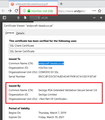
download .pdf from http site works fine, same file using https fails
When I try to download a .pdf file from my site using http://www.andycraft-beads.co.uk/a5BeadArtBookletGood.pdf I get a file of 5,083,136 bytes which then correctly opens in e.g. Adobe Acrobat Reader. If I use https://www.andycraft-beads.co.uk/a5BeadArtBookletGood.pdf instead, I get a file of 46,153,728 bytes which is corrupt and un-openable. Both IE and Chrome open the file correctly from either source. Is this me?
Ausgewählte Lösung
Hmm, I get the same for both http and https in Firefox 67 on Windows 10.
Do you have any intermediaries that proxy or filter your browsing, such as security software, that could be messing up the retrieval? If nothing comes to mind, check whether you get the EVSSL certificate indication in the address bar and have the expected issuer on the certificate, or whether something else shows up there.
To view the cetificate, you can call up the Page Info dialog using any of these methods:
- right-click a blank area of the page and choose View Page Info * (menu bar) Tools menu > Page Info
- click the padlock or "i" icon to the left of the site address, then the ">" icon, then More Information
Select Security at the top of the dialog, then click the "View Certificate" button.
Here is a screenshot for comparison:

Alle Antworten (2)
Ausgewählte Lösung
Hmm, I get the same for both http and https in Firefox 67 on Windows 10.
Do you have any intermediaries that proxy or filter your browsing, such as security software, that could be messing up the retrieval? If nothing comes to mind, check whether you get the EVSSL certificate indication in the address bar and have the expected issuer on the certificate, or whether something else shows up there.
To view the cetificate, you can call up the Page Info dialog using any of these methods:
- right-click a blank area of the page and choose View Page Info * (menu bar) Tools menu > Page Info
- click the padlock or "i" icon to the left of the site address, then the ">" icon, then More Information
Select Security at the top of the dialog, then click the "View Certificate" button.
Here is a screenshot for comparison:

Security icon is mine and valid. Clicking on the security information icon and clearing cookies and data for this site resolved the problem. Thanks for your help.

